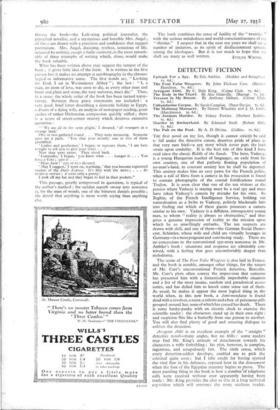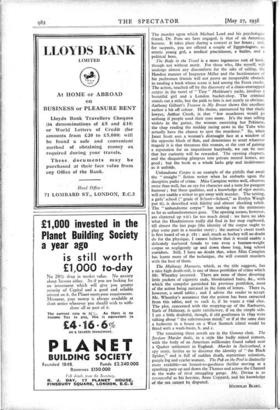DETECTIVE FICTION
7s. 6d.) The Pub on the Pool. By A. D. Divine. (Coffins. 7s. 6d.)
THE first novel on my list, though it cannot strictly be said to fall under the detective canon, deserves pride of place as that very rare bird—a spy story which never puts the least strain upon credulity. It is the best tale of this kind I have read since the classic Riddle of the Sands. The hero, Vadassy, is a young Hungarian teacher of languages, an exile from his own country, one of that pathetic floating population of no-man's-land, in constant anxiety lest he shall be deported. This anxiety makes him an easy pawn for the French police, when a roll of films from a camera in his possession is found to contain photographs of the coastal fortifications round Toulon. It is soon clear that one of the ten visitors at the pension where Vadassy is staying must be a real spy and must have taken Vadassy's camera by mistake for his own. So Beghin, of the French Intelligence Service, holding out naturalisation as a bribe to Vadassy, politely blackmails him into finding out which of these guests possesses a camera similar to his own. Vadassy is a diffident, introspective young man, to whom "reality is always so obstructive," and thus gives a genuine impression of reality to the mission upon which he so unwillingly embarks. The ten suspects are drawn with skill, and one of them—the German Social Demo- crat, Schimler, whose wife and child are virtually hostages in Germany—is a most poignant and convincing study. There are no concessions to the conventional spy-story nonsense in Mr. Ambler's book : situations- and suspense are admirably con- trived, with a feeling that goes uncomfortably deeper than melodrama.
The scene of The Four False Weapons is also laid in France, and the book is notable, amongst other things, for the return of Mr. Carr's unconventional French detective, Bencolin. Mr. Carr's plots often convey the impression that someone has presented him with a fantastically improbable situation and a list of the most insane, random and paradoxical acces- sories, and has defied him to knock some sense out of them. As usual, he makes it appear the most logical thing in the world when, in this new book, a demi-mondaine is found dead with a revolver, a razor, a stiletto and a box of poisonous pills grouped around her, none of which has caused her death. There is some hanky-panky with an electric clock to exercise the scientific reader : the characters stand up in their own right : and suspicion flits like a butterfly from one person to another. You will also find plenty of good and amusing dialogue to enliven the detection.
Arrogant Alibi is an excellent example of the " straight " detective novel—many angles, but no frills : some readers may find Mr. King's attitude of detachment towards his characters a trifle forbidding ; his plot, however, is complex, ingenious, and scrupulously fair. The sixth sense, which every detection-addict develops, enabled me to pick the criminal quite soon ; but I take credit for having spotted the vital flaw in his defences, exposed later in the denouement when the foot of the Egyptian mummy begins to move. The most puzzling thing in the book is how a number of telephone calls were received without ever apparently having been made : Mr. King provides the, clue to this in a long technical exposition which will entrance the more studious reader.
The murder upon which Michael Lord and his psychologist friend, Dr. Pons are here engaged, is that of an American hostess. It takes place during a concert at her house ; and, for suspects, you are offered a couple of Egyptologists, an erratic young girl, a medical practitioner, a butler, and a political boss.
The Body in the Trawl is a more ingenuous sort of hOok, though not without merit. For those who, like myself, will undergo almost any discomforts for the sake of sailing, the Hendon manner of Inspector Miller and the facetiousness of his yachtsmen friends will not prove an insuperable obstacle to reading a book whose scene is laid among the Essex creeks. The action, touched off by the discovery of a chain-enwrapped corpse in the trawl of " Tiny " Meldrum's yacht, involves a beautiful girl and a London bucket-shop. The criminal stands out a mile, but the path to him is not nearly so obvious. Anthony Gilbert's Treason in My Breast shows this excellent author a bit off colour. His theme, announced by that shady lawyer; Arthur Crook, is that "few murderers would go unhung if people used their eyes more. Ws- the Man selling violets in the gutter, the woman exercising her Pekinese, the chap reading the midday racing news in the Tube who actually have the chance to spot the murderer." So, when Janet Scott sees a woman's distraught face at a window of the opposite block of 'flats, and determines to avert whatever tragedy it is that threatens this woman, at the cost of gaining a reputation for an impertinent busybody, we can be sure that her curiosity will be rewarded. The opening chapters, and the disquieting glimpses into private mental homes, are good ; but the book as a whole lacks grip • and incisiveness as it unfolds.
Unhandsome Corpse is an example of the pitfalls that await the " straight " fiction writer when he embarks 'upon the deceptive paths of crime. Miss Campion .writes well, observes more than well, has an eye for character and a taste for pungent humour ; but these qualities, and a knowledge of rigor mortis, will not enable a writer to get away with murder. The setting, a girls' school (" grade of School—School," as Evelyn Waugh put it), is described with fidelity and almost shocking relish. The "unhandsome corpse" has nothing on the mistresses as far as unhandsomeness goes. The opening scenes, however, are cluttered up NNit far too much detail : we have no idea what the Headmistress really did find in her map cupboard, till almost the last page (the identity of the corpse ought to play some part in a murder story) ; the matron's sweet tooth is first heard of on p. 281: and, much as hockey will no doubt do for the physique, I cannot believe that it would enable a delicately nurtured female to tote even a bantam-weight corpse so negligently up and down those long, long school corridors. Still, I have no doubt that, when Miss Campion has learnt more of the technique, she will commit murders with the best of diem.
The Malinsay Massacre, which, as the title suggests, has a nice high death-roll, is one of those portfolios of crime which Mr. Wheatley invented. There are none of .those diverting little packets of cigarette ends, bloodstained hairs, &c., with which the compiler garnished his previous portfolios, most
of the action being narrated in the form of letters. There is, however, a small tablet ; and I advise the reader to accept Mr. Wheatley's assurance that the poison has been extracted from this tablet, and to suck it, if he wants a vital clue. The plot, concerned with the mopping-up of the Raeburns, Earls of Malinsay, is quite satisfactory, if on the simple side. I am a little doubtful, though, if old gentlemen in 1899 were talking about "the subconscious mind," or if :Ili the same date a bedroom in a house on a West Scottish island would be fitted with a wash-basin, h. and c. •- •
The remaining three novels are in the Gamma class. The jordans Murder deals; in a style like badly mixed Cement,
with the body of an Anierican millionaire found naked near
a Quaker settlement in England. Murder in Switzerland, a spy story, invites us to discover the identity of "the Black
Spider," and is full of sudden death, mysterious scientists,
purple fog and scarlet women. The Pub on the Pool is distinctly more readable–:an honest-to-goodness thriller moving at a spanking pace up and down the Thames and across the Channel in the wake of rival smuggling gangs. Mr. Divine is as resourceful as his heroine, Anne Coppard, and his -knowledge of -the sea cannot be disputed.
NICHOLAS BLAKE.



















































 Previous page
Previous page